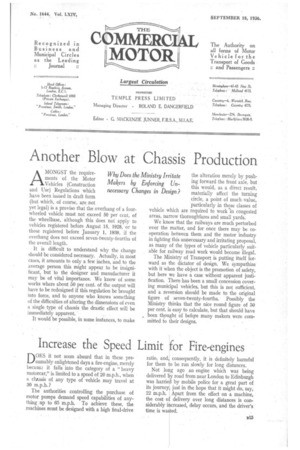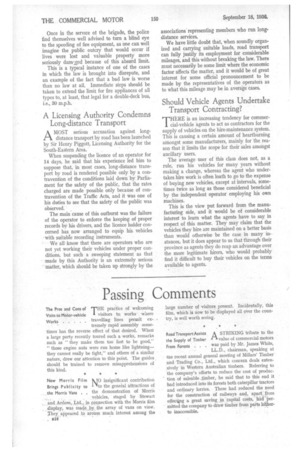Increase the Speed• Limit or Fire-engines
Page 29

Page 30

If you've noticed an error in this article please click here to report it so we can fix it.
r'N OES it not seem absurd that in these pre sumably enlightened days a fire-engine, merely because it falls into the category of a "heavy motorcar," is limited to a speed of 20 m.p.h., when a chAssis of any type of vehicle may travel at 30 m.p.h.?
The authorities controlling the purchase of motor pumps demand speed capabilities of anything up to 65 m.p.h.. To achieve these, the machines must be designed with a high final-drive ratio, and, consequently, it is definitely harmful for them o be run slowly for long distances.
Not lo g ago an engine which was being delivered i y road from near London to Edinburgh was harrie s by mobile police for a great part of its journey just in the hope that it might do, say, 22 m.p.h. Apart from the effect on a machine, the cost o delivery over long distances is considerably creased, delay occurs, and the driver's time is wa ted. Once in the service of the brigade, the police find themselves well advised to turn a blind eye to the speeding of fire equipment, as one can well imagine the public outcry that would occur if lives were lost and valuable property more seriously danr,ged because of this absurd limit.
This is a typical instance of one of the cases in which the law is brought into disrepute, and an example of the fact that a bad law is worse than no law at all. Immediate steps should be taken to extend the limit for fire appliances of all types to, at least, that legal for a double-deck bus, i.e., 30 m.p.h.
A Licensing Authority Condemns Long-distance Transport
AMOST serious accusation against longdistance transport by road has been launched by Sir Henry Piggott, Licensing Authority for the South-Eastern Area.
When suspending the licence of an operator for 14 days, he said that his experience led him to suppose that, in most cases, long-distance transport by road is rendered possible only by a contravention of the conditions laid down by Parliament for the safety of the public, that the rates charged are made possible only because of contravention of the Traffic Acts, and it was one of his duties to see that the safety of the public was observed.
The main cause of this outburst was the failure of the operator to enforce the keeping of proper records by his drivers, and the licence holder concerned has now arranged to equip his vehicles with suitabre recording instruments.
We all know that there are operators who are not yet working their vehicles under proper conditions, but such a sweeping statement as that made by this Authority is an extremely serious matter, which should be taken up strongly by the associationsrepresenting members who run longdistance services.
We have little doubt that, when soundly organized and carrying suitable loads, road transport can fully justify its employment for considerable mileages, and this without breaking the law. There must necessarily be some limit where the economic factor affects the matter, and it would be of great interest for some official pronouncement to be made by the representatives of the operators as to what this mileage may be in average cases.
Should Vehicle Agents Undertake Transport Contracting?
THERE is an increasing tendency for commercial-vehicle agents to act as contractors for the supply of vehicles on the hire-maintenance system. This is causing a certain amount of heartburning amongst some manufacturers, mainly for the reason that it limits the scope for their sales amongst ancillary users.
The average user of this class does not, as a rule, run his vehicles for many years without making a change, whereas the agent who undertakes hire work is often loath to go to the expense of buying new vehicles, except at intervals, sometimes twice as long as those considered beneficial by the independent operator employing his own machines.
This is the view put forward from the manufacturing side, and it would be of considerable interest to learn what the agents have to say in respect of this matter. They may claim that the vehicles they hire are maintained on a better basis than would otherwise be the case in many instances, but it does appear to us that through their province as agents they do reap an advantage over the more legitimate hirers, who would probably find it difficult -to buy their vehicles on the terms available to agents.




























































































